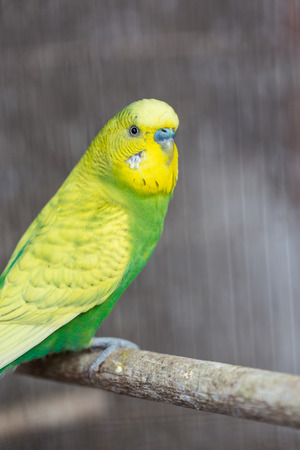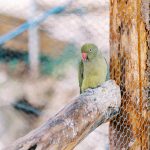1. Understanding Your Cockatiel
Cockatiels are intelligent, social birds with unique personalities. Understanding their behavior and natural instincts can help you build a strong bond with your feathered friend. These little parrots thrive on interaction, routine, and mental stimulation, so getting to know their needs is key to keeping them happy.
Personality Traits
Cockatiels are known for their affectionate and curious nature. They enjoy being around people and can develop strong attachments to their owners. Some cockatiels love cuddles, while others prefer just perching on your shoulder. Each bird has its own personality, so take time to observe and understand what makes yours comfortable.
Common Behaviors
Understanding cockatiel behavior helps you respond appropriately to their needs. Here are some common behaviors and what they mean:
| Behavior | Meaning |
|---|---|
| Crest Position Changes | A raised crest usually means excitement or curiosity, while a flattened crest may indicate fear or aggression. |
| Whistling and Singing | Males often whistle more than females. Singing is a sign of happiness and contentment. |
| Puffing Up Feathers | If they fluff up briefly, it’s usually for relaxation, but if prolonged, it could indicate illness. |
| Bobbing Head or Hissing | A sign of excitement or sometimes warning when they feel threatened. |
| Tucking Head Under Wing | This means they are feeling safe and ready to sleep. |
Their Natural Instincts
Cockatiels have natural instincts that influence their behavior. In the wild, they live in flocks and rely on social interactions for safety and companionship. This is why pet cockatiels crave attention from their owners. They also have a strong urge to chew, forage, and explore their surroundings.
The Importance of Social Interaction
Cockatiels are highly social birds that need daily interaction to stay happy. If left alone too long, they may become lonely or even depressed. Talking to them, playing with toys together, or simply letting them perch on your shoulder can strengthen your bond.
Mental Stimulation and Enrichment
A bored cockatiel can develop unwanted behaviors like excessive screaming or feather plucking. Providing toys, puzzles, and occasional treats hidden in foraging toys can keep them engaged and mentally active.
2. Creating the Perfect Home
Providing your cockatiel with a comfortable and safe environment is essential for their happiness and well-being. From choosing the right cage to adding perches, toys, and selecting the best location in your home, here’s everything you need to know.
Cage Size and Setup
A spacious cage allows your cockatiel to move around comfortably. The minimum recommended size for a single cockatiel is 24 inches wide, 18 inches deep, and 24 inches tall. However, bigger is always better! The bars should be spaced no more than ½ inch apart to prevent injury.
| Feature | Recommendation |
|---|---|
| Minimum Cage Size | 24″ W x 18″ D x 24″ H |
| Bar Spacing | ½ inch or less |
| Material | Non-toxic metal (avoid lead or zinc coatings) |
| Door Type | Secure latches to prevent escapes |
Perches: Variety is Key
Your cockatiel’s feet need exercise, so providing different types of perches is important. Natural wood perches are best, as they help keep nails trimmed and provide a comfortable grip. Avoid sandpaper-covered perches, as they can hurt your bird’s feet.
Recommended Perch Types:
- Natural wood perches: Mimic branches found in nature.
- Rope perches: Soft and flexible for foot comfort.
- Ladder perches: Great for climbing and exercise.
- Avoid plastic perches: They can be too slippery and uncomfortable.
Toys and Mental Stimulation
Cockatiels are intelligent birds that need mental stimulation to stay happy. Provide a variety of toys such as shreddable paper, bells, ladders, and foraging toys. Rotate toys regularly to keep things interesting!
Toy Ideas:
- Foraging toys: Hide treats inside for mental engagement.
- Bells: Many cockatiels love ringing small bells.
- Swinging toys: Helps with balance and entertainment.
- Avoid small parts: Ensure all toys are safe and non-toxic.
Cage Placement: Where Should It Go?
The location of your cockatiels cage plays a big role in their happiness. Place the cage in a quiet but social area where they can interact with family without being overwhelmed by noise or sudden movements.
Cage Placement Tips:
- Avoid direct sunlight: Prevent overheating by keeping the cage away from direct sun exposure.
- No drafts: Keep the cage away from windows, doors, and air vents to avoid cold drafts.
- At eye level: Cockatiels feel safer when their cage is at or near eye level.
- Away from the kitchen: Fumes from non-stick cookware can be toxic to birds.
By setting up a spacious cage with varied perches, engaging toys, and placing it in a safe spot, you’ll create the perfect home for your feathered friend!

3. Nutrition and Healthy Diet
Feeding your cockatiel a balanced diet is essential for their overall health and happiness. A well-rounded diet includes high-quality pellets, fresh fruits, vegetables, and occasional treats. Avoid feeding them harmful foods that can negatively affect their health.
Best Foods for Your Cockatiel
A healthy cockatiel diet should consist of the following:
- Pellets: These should make up about 60-70% of their diet as they provide essential nutrients.
- Fresh Fruits: Offer small amounts of apples, bananas, berries, and melons.
- Vegetables: Leafy greens like kale, spinach, carrots, and bell peppers are great options.
- Seeds (in moderation): While cockatiels love seeds, they should only be an occasional treat due to high fat content.
- Cooked Grains: Brown rice, quinoa, and whole wheat pasta can be offered in small amounts.
Foods to Avoid
Certain foods are toxic or unhealthy for cockatiels. Keep these off their menu:
| Food | Reason to Avoid |
|---|---|
| Avocado | Toxic to birds and can cause serious illness. |
| Chocolate | Contains theobromine, which is poisonous to birds. |
| Caffeine | Affects the heart and nervous system. |
| Dairy Products | Cockatiels lack the enzymes to digest lactose properly. |
| Sugary & Salty Foods | Poor nutrition and can lead to obesity and other health issues. |
| Onions & Garlic | Toxic and can cause digestive problems or anemia. |
Treats & Feeding Tips
- Treats in Moderation: Occasional millet sprays or small pieces of unsalted nuts can be given as special rewards.
- Cage Hygiene: Remove uneaten fresh food after a few hours to prevent spoilage and bacteria growth.
- Diverse Diet: Introduce new foods gradually to ensure variety while avoiding digestive issues.
- Clean Water Daily: Always provide fresh water in a clean dish.
A nutritious diet is key to keeping your cockatiel healthy, energetic, and happy. By providing a balanced mix of pellets, fresh produce, and safe treats, you’ll ensure your feathered friend thrives!
4. Socializing and Training
Cockatiels are social birds that thrive on interaction and mental stimulation. Building a strong bond with your cockatiel through training and positive reinforcement will help keep them happy and prevent behavioral issues.
Building Trust and Bonding
Before you start training, it’s important to establish trust with your cockatiel. Spend time near their cage, talk to them in a gentle voice, and offer treats to create positive associations. Once they feel comfortable, you can encourage them to step onto your hand.
Steps to Bond with Your Cockatiel
| Step | Description |
|---|---|
| 1. Talk Softly | Speak to your cockatiel in a calm, soothing voice daily. |
| 2. Offer Treats | Use millet or their favorite snack to build trust. |
| 3. Hand Training | Encourage them to step up onto your finger using slow movements. |
| 4. Playtime | Let them explore outside the cage in a safe environment. |
Teaching Tricks and Commands
Cockatiels are intelligent and can learn simple tricks like stepping up, waving, or even retrieving small objects. Use positive reinforcement by rewarding them with treats and praise when they follow commands correctly.
Basic Tricks to Teach
- Step-Up Command: Gently press your finger against their chest and say “step up.” Reward when they comply.
- Twirling: Hold a treat above their head and move it in a circle to encourage spinning.
- Toy Retrieval: Train them to pick up small objects by offering rewards when they grab the item.
Encouraging Talking and Whistling
Cockatiels can learn to mimic words and whistle tunes with practice. Repetition is key—say simple words often and whistle melodies while interacting with them.
Tips for Teaching Speech & Whistling
- Select Simple Words: Start with easy words like “hello” or their name.
- Repeat Daily: Say the same word consistently so they recognize it.
- Mimic Sounds: Whistle tunes frequently, as cockatiels often pick up melodies faster than words.
- Praise Success: Reward any attempt at mimicking sounds with enthusiasm.
Avoiding Behavioral Issues
Lack of interaction or improper handling can lead to unwanted behaviors such as biting, excessive screaming, or feather plucking. Keeping your cockatiel engaged through socialization reduces stress and promotes good behavior.
Troubleshooting Common Behavioral Issues
| Issue | Possible Cause | Solution |
|---|---|---|
| Biting | Lack of trust or feeling threatened | Avoid sudden movements; use slow, gentle interactions. |
| Screaming | Boredom or seeking attention | Provide toys, engage in playtime, and avoid reinforcing loud calls. |
| Feather Plucking | Anxiety, loneliness, or health issues | Create a stimulating environment; consult a vet if necessary. |
The more time you spend interacting with your cockatiel, the stronger your bond will be. With patience and consistency, you’ll have a friendly, well-trained companion who enjoys spending time with you!
5. Health and Wellness Tips
Keeping your cockatiel healthy is essential for a long and happy life. Understanding common health concerns, recognizing signs of illness, and knowing when to visit the vet can make all the difference. Here’s what you need to know to ensure your feathered friend stays in top shape.
Common Health Concerns
Cockatiels are generally hardy birds, but they can still face several health issues. Some of the most common concerns include:
- Respiratory Infections: Symptoms include sneezing, wheezing, or nasal discharge.
- Feather Plucking: Often caused by stress, boredom, or underlying medical conditions.
- Psittacosis (Parrot Fever): A bacterial infection that can cause lethargy, difficulty breathing, and weight loss.
- Nutritional Deficiencies: A poor diet can lead to vitamin deficiencies and weak immune function.
- Mites and Parasites: Can cause itching, feather loss, and skin irritation.
Signs of Illness
Cockatiels are good at hiding illness, so its important to watch for subtle changes. If you notice any of the following symptoms, it may be time to consult a vet:
| Signs of Illness | Possible Causes |
|---|---|
| Lethargy or Weakness | Infection, nutritional deficiency |
| Fluffed-Up Feathers for Long Periods | Cold, illness, stress |
| Loss of Appetite or Weight Loss | Disease, digestive issues |
| Labored Breathing or Wheezing | Respiratory infection |
| Unusual Droppings (Color/Consistency) | Digestive problems, liver disease |
| Excessive Scratching or Feather Loss | Mites, allergies, stress |
| Sitting at the Bottom of the Cage | Severe illness or injury |
Grooming Needs
Regular grooming helps keep your cockatiel comfortable and looking its best. Here are some key aspects of cockatiel grooming:
Nail Trimming
Cockatiels’ nails grow continuously and may need trimming every few months. If they become too long, they can cause discomfort or difficulty perching.
Beak Maintenance
A healthy diet with cuttlebones and mineral blocks helps prevent overgrown beaks. If the beak appears too long or misaligned, consult a vet.
Feather Care & Bathing
Cockatiels love occasional baths! You can mist them with water or provide a shallow dish for bathing. This helps keep their feathers clean and reduces dust buildup.
When to Take Your Cockatiel to the Vet
A yearly check-up with an avian veterinarian is recommended to ensure overall health. However, if you notice signs of illness like difficulty breathing, drastic behavior changes, or unusual droppings, seek veterinary care immediately. Early detection can prevent serious complications!
Your cockatiel depends on you for its well-being. By staying informed about health concerns and providing proper care, you can help your bird live a long and joyful life.


